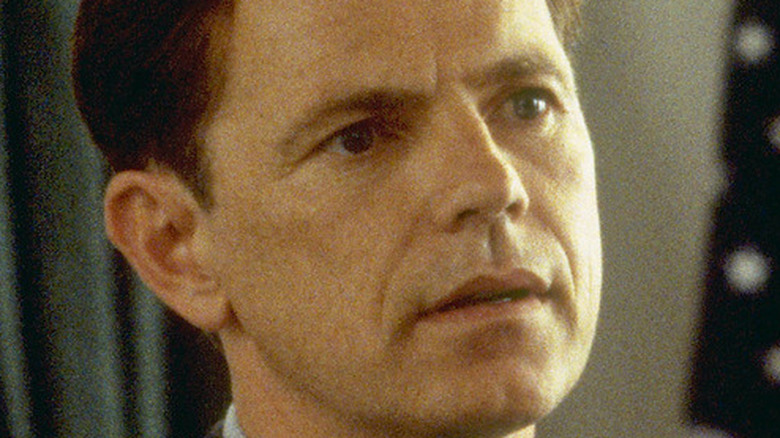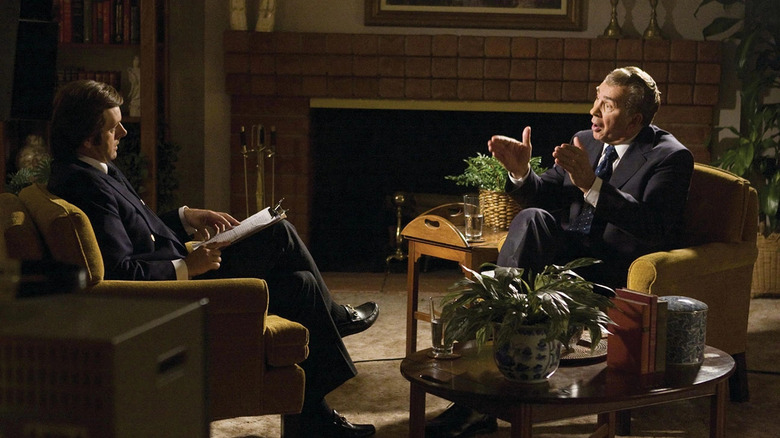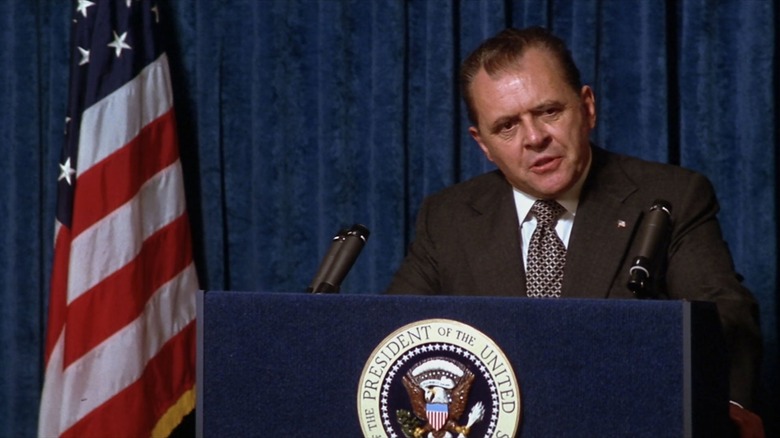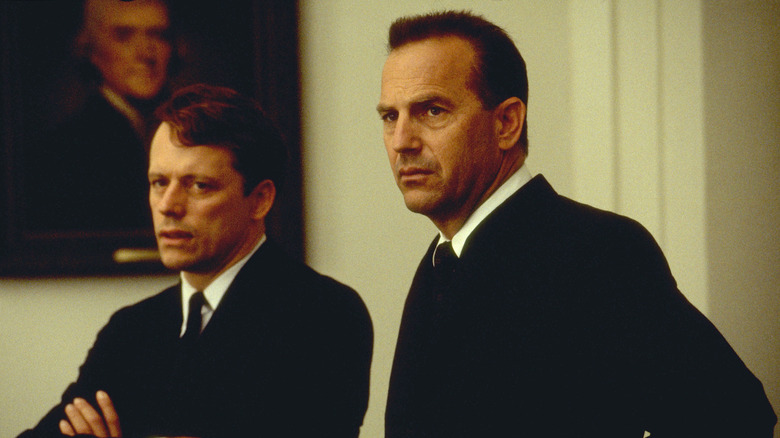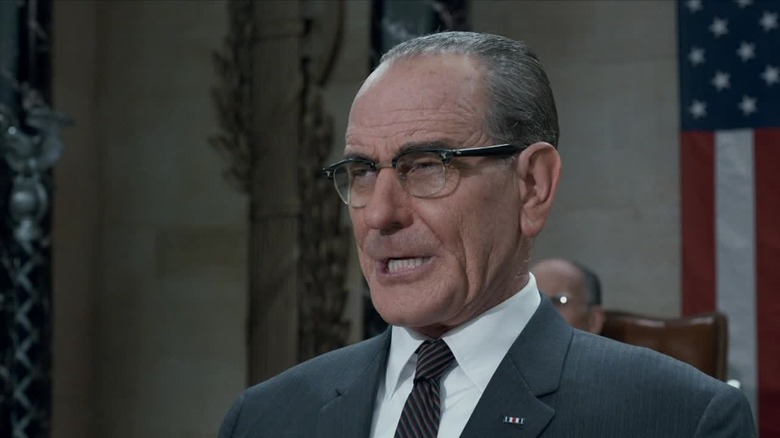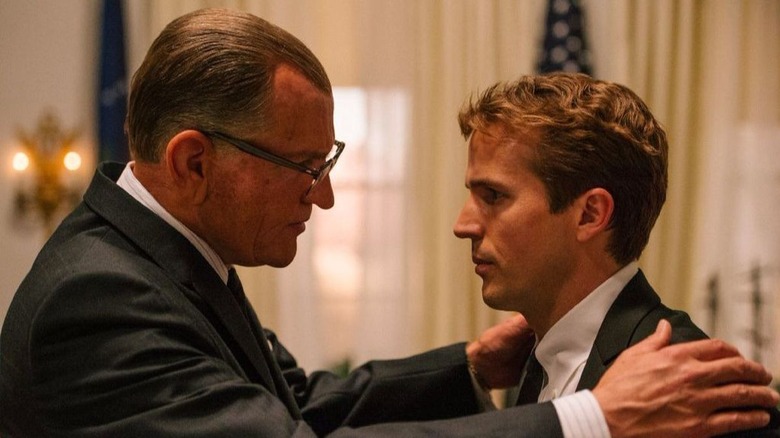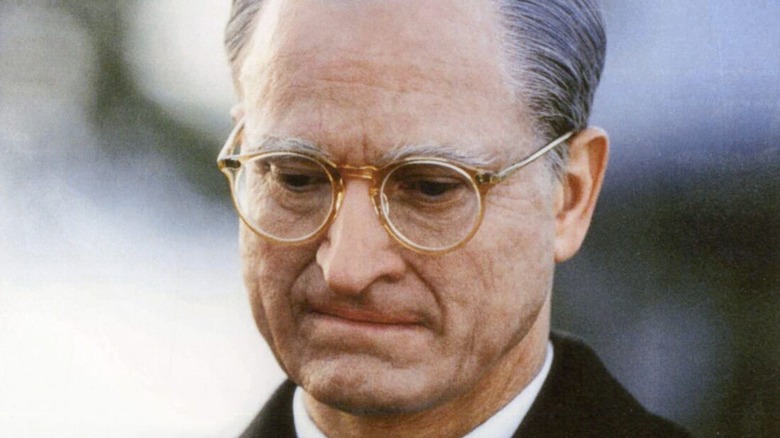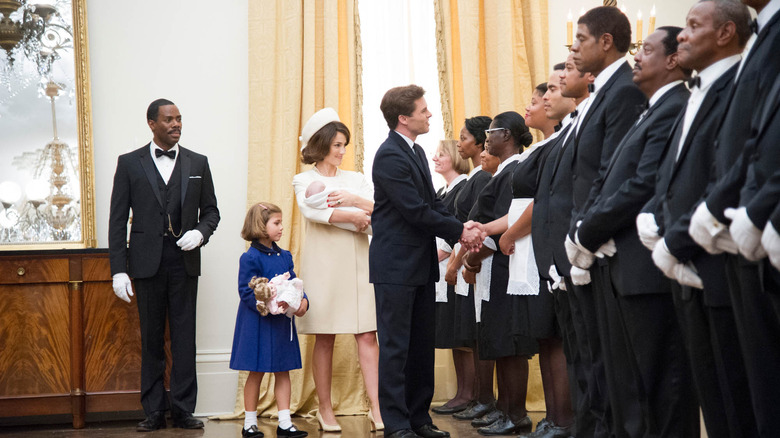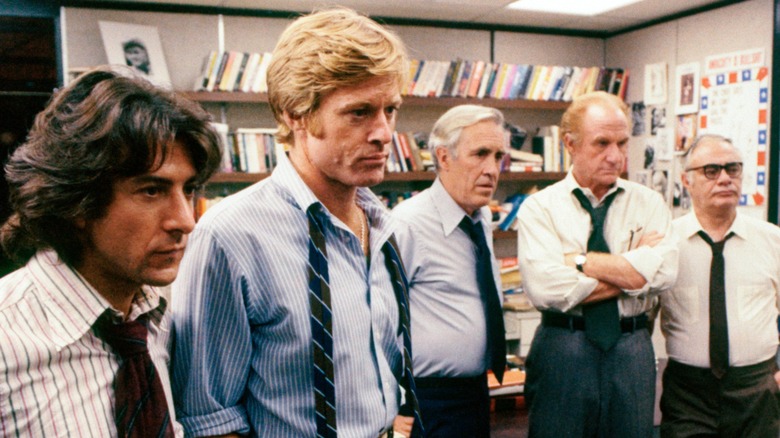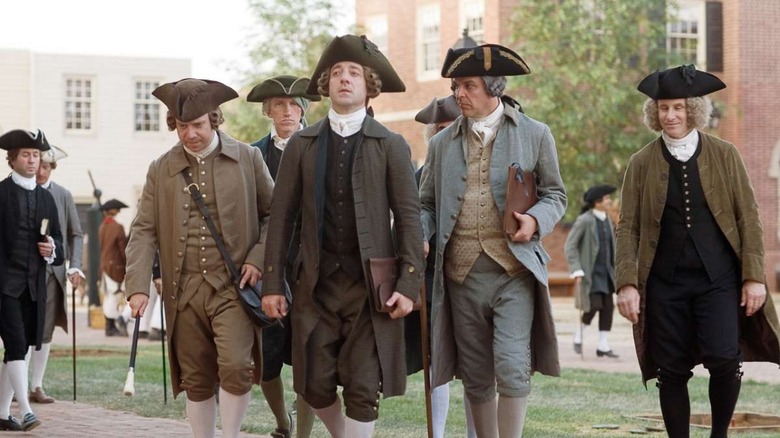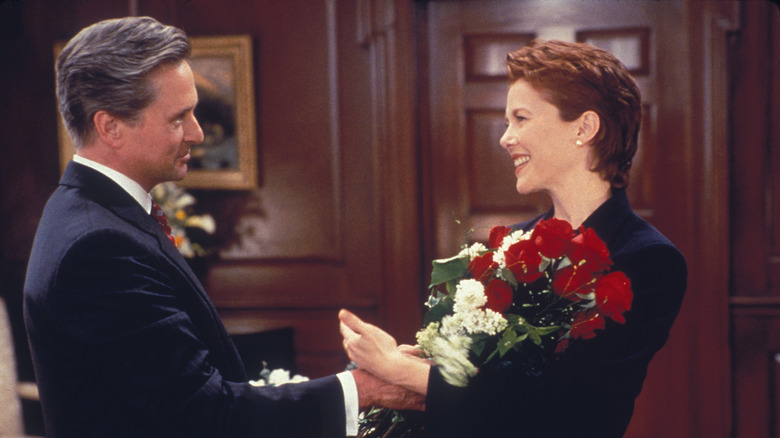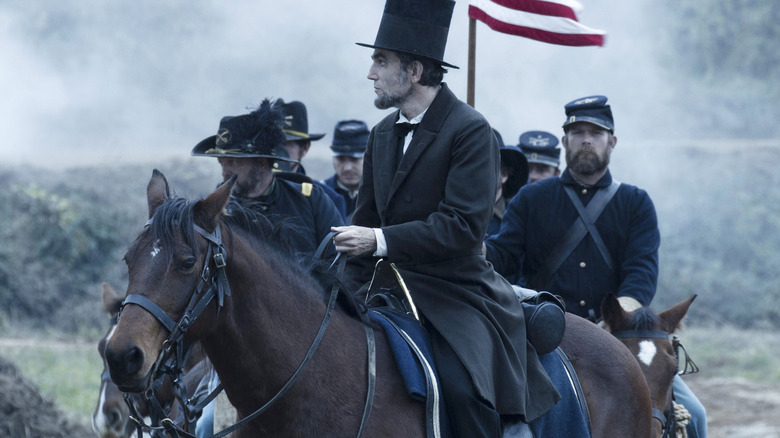The Most Accurate Movies And Miniseries About American Presidents
It's not easy depicting presidents. Notable, important, and fascinating as they almost always are, filmmakers have to juggle competing and often incomplete records from people with agendas who knew the subject during their terms, limited screen time to tell massive stories, and their own biases and artistic intentions. The result is often a mixed bag of good faith authentic portrayals and hefty creative liberties. But even some movies that dramatize history get important parts of the U.S. presidency right, be it by nailing the atmosphere at the time, faithfully depicting the surrounding advisors and family members, or excellent performances of the commander in chiefs themselves.
From "All The President's Men' to "The American President," "All The Way," "Thirteen Days," "Nixon," and "John Adams," these are the movies and miniseries that came the closest to recreating the Oval Office and the men who served in it.
Frost/Nixon
Richard Nixon is mainly remembered for covering up the Watergate break-in and resigning in disgrace when it became clear that Congress would throw him out of office. After receiving a controversial pardon from his successor, Gerald Ford, he laid low for a bit and made only infrequent appearances (via the National Constitution Center). Some of the most famous times were the interviews he gave to British Journalist David Frost in 1977, which Wilson Center says was the only time the disgraced former president ever spoke about the Watergate affair. Rather infamously, Nixon responded to a question about the president committing crimes by saying, "Well, when the president does it, that means it is not illegal." Yikes.
In 2006, "Frost/Nixon," written by Peter Morgan, debuted on stage. A year later, it was on Broadway, and a year after that, it was turned into an Oscar-winning film of the same name. The movie took some big creative liberties. For example, the moment where Nixon drops the "it's not illegal" line was played like a giant, gong-banging "gotcha!" moment where Frost "wins" the debate. It was not perceived that way at the time. Still, the article concludes that "Frost/Nixon" got a lot right, like the motivations of the two participating men. Frost, played by Michael Sheen, wanted to further his career with a huge interview. And Nixon, played by Frank Langella (who was nominated for an Oscar), sought to salvage his ruined reputation and become a respected elder statesman.
Nixon
We can't exactly call "Nixon" star Anthony Hopkins a spitting image of the controversial 36th president, but these types of roles are about much more than superficial impressions. Hopkins gets the important stuff right, even though the 1995 Oliver Stone-directed movie was controversial upon release. Audiences — convinced by Nixon's crafty post-presidency campaign to restore his image — felt that the movie demonized Tricky Dick beyond what his actual sins called for, depicting him as a cantankerous, power-hungry, paranoid bully prone to drunken outbursts and all manner of shady dealings.
But as Robert Brent Toplin writes over at History News Network, nothing we've learned about Nixon in the decades since has reinforced that generosity. On the contrary, recordings, surviving documents and communications, and talks with those who knew Nixon during his time in the Oval Office paint a picture of the man that is similar to what "Nixon" suggested. Which was, well, a cantankerous, power-hungry, paranoid bully prone to drunken outbursts who engaged in shady dealings.
But Stone never set out to smear the guy, just to tell an honest story that the historical record could support. According to The New York Times, he saw Nixon as a tragic figure, beaten by hubris. Stone said, "The toughness that it took for him to rise to the top as an outsider and take the knocks were the very qualities that made him cynical and bitter and defeated him."
Thirteen Days
History says that nail-biting Cold War anxiety peaked for 13 days in October 1962 when U.S. spy planes spotted hostile missile construction underway in Soviet-friendly Cuba, indicating the USSR was planning to stash nukes frighteningly close to the U.S. mainland (in response to U.S. warheads in Turkey). Luckily, President John F. Kennedy was up to the task. In one of the best displays of presidential leadership ever, his administration deftly handled the crisis, preventing all-out nuclear conflict. On October 28, a deal was brokered, ending the standoff with both powers mutually withdrawing their warheads from each other's borders and establishing a hotline between Washington and Moscow to prevent another such crisis from unfolding.
You're probably thinking this is movie material, and it was. In 2000, Bruce Greenwood starred as Kennedy in "Thirteen Days," based on 1997's "The Kennedy Tapes: Inside the White House During the Cuban Missile Crisis," by Ernest R. May and Philip D. Zelikow. The movie did take some liberties. Per The Washington Post, lots of executive advisors were controversially combined into a fictional version of real-life advisor Kenny O'Donnell (Kevin Costner), leading his contributions to be greatly exaggerated.
But where it counts, "Thirteen Days" nailed the tension in the oval office during one of the scariest moments in history, when the weight of the world was on the shoulders of a young man who'd only been president for a few months. It's no documentary, but it admirably captured the mercifully brief moment.
All The Way
Lyndon Johnson remains a polarizing figure in American politics. On one hand, he was instrumental in passing the Civil Rights Act and launched the noble war on poverty, which sought to lift the nation's most vulnerable citizens out of despair (via Britannica). On the other hand, he escalated the Vietnam War (per History) and enjoyed being a loud, boorish man to intimidate people. The guy even had meetings on the toilet, and this was a few decades before you could just turn the camera off and mute yourself on Microsoft Teams (per Inside Hook).
In other words, he's an actor's dream role, especially if that actor is as talented a chameleon as Bryan Cranston. Like many presidential biopic films, "All The Way" — originally a Broadway play also starring Cranston as the 36th president — played fast and loose with some facts. The New York Times cataloged a handful of creative liberties, including how the film falsely depicts Johnson as weakening Civil Rights legislation so he could sell it to conservatives and how Stokely Carmichael, rather than John Lewis, was Martin Luther King Jr.'s right-hand man.
However, Bryan Cranston is so convincing as Johnson that the movie is still highly recommendable. "It feels like you're witnessing a miracle, at times, watching Bryan Cranston as Lyndon B. Johnson in HBO's 'All The Way,'" writes Matthew Gilbert over at The Boston Globe. "It's like witnessing a resurrection of sorts, without the assistance of any 'Game of Thrones'-like hoodoo."
LBJ
If HBO's "All The Way" prioritized Bryan Cranston's Lyndon Johnson over nailing the relevant events, the following year's "LBJ" — starring Woody Harrelson in the title role — makes up for it. Directed by Rob Reiner, the movie follows Johnson during the passage of Civil Rights legislation that earned him few friends in his native south. But it focuses mainly on his being sworn in following the assassination of John F. Kennedy in November 1963, which saw then-Vice President Johnson swept into the Oval Office.
For Politico, Joshua Zeitz argues that although the film wasn't perfect by any means — it slightly exaggerates Johnson's personal excitement for the Civil Rights Act and plays up the importance of his beef with Robert Kennedy, for example — it got the big-ticket items right. It captured the high status of the U.S. Presidency in the early-mid '60s when it was still revered by everyone, before polarization and tribal squabbling robbed America of the ability to come together to respect the office. Harrelson also plays a solid Johnson (although Cranston's earlier performance cast a long shadow) and pays a good amount of attention to Johnson's hardball politicking, which moved the legislative needle in his direction more than once.
In the end, maybe its best feature is how it captures the walking, talking ball of contradictions that Johnson was. He's not an easy man to stuff in a box-like "good" or "bad." Maybe that's what makes him such a fascinating president.
Truman
In summer 1944, Harry S. Truman was a little-known senator from Missouri, per Britannica. Barely a year later, as president of the United States, he made the no-doubt agonizing decision to drop the atomic bombs on Japan, helping end World War II. That kind of improbable, meteoric rise — made possible by Franklin Delano Roosevelt's previous vice president, Henry Wallace, being booted from the Democratic ticket by party moderates, and FDR's death in April 1945 — is just begging for the Hollywood treatment.
Few major films have featured Truman as a character. But in 1995, we did get "Truman," the HBO TV movie starring Gary Sinise ("Forrest Gump," "Apollo 13"). The film has a broad scope, focusing on Harry's humble beginnings, rapid political rise, and his actions during the end of the Second World War when he'd only been president for a few short months. TV Guide gave the film a lukewarm review, saying, "Over-applauded by many critics, TRUMAN is sturdy, standardized biographical moviemaking elevated by incontestably brilliant acting. Unfortunately, this cavalcade of facts and figures is conceived and executed impersonally like a docent delivering a speech in front of the waxworks at a Presidential museum."
Luckily, it doesn't have to be a fantastic film to get on this list — just accurate, which even the aforementioned review concedes it is. It doesn't hurt that Sinise was terrific as the 33rd president. And for what it's worth, most critics disagreed with TV Guide and thought the movie was pretty dang good.
The Butler
Who do you think would have the most intimate relationships with the most presidents? Most vice presidents and advisors only serve one POTUS, and so far, no commanders in chief have traded spouses (that we know of). The answer just might be the humble butler. Like Eugene Allen, who was portrayed powerfully by Forest Whitaker in Lee Daniels' 2013 biopic "The Butler." Why? The man served under not one, not two, but eight presidents for a total White House butlering gig that stretched 34 years.
Like almost all biopics, creative liberties were indeed taken. The biggest is the character himself, who is named Cecil and has a completely different backstory than the actual figure he was inspired by. But as The Daily Beast points out, most of these liberties — like his pre-White House upbringing and family life and certain events on his first day — had little to do with the presidents themselves.
Most of the scenes with actual presidents, though? Largely on the money. The butler was around when Kennedy (James Marsden) was assassinated, when Johnson (Liev Schreiber) held his infamous toilet meetings, and when Nancy Reagan (Jane Fonda) invited him and his wife to a dinner as guests of the president (Alan Rickman), and when he campaigned for Barack Obama. Dwight Eisenhower (Robin Williams), Richard Nixon (John Cusack), and Martin Luther King, Jr. (Nelsan Ellis) also make brief appearances in Cecil's Forrest Gump-like story. It's a must for any history buff.
All The President's Men
It feels depressingly routine now, but election-rigging corruption at least used to be taboo, as evidenced by the Watergate scandal that tanked Richard Nixon's presidency and left his legacy in disgrace. If you were alive during the early '70s, you were probably wondering what notes Hollywood was taking as the Nixon administration unraveled before the eyes of the world.
Sure enough, big-time movies depicting the scandal so scandalous that we've been slapping the -gate suffix onto every scandal since were right around the corner, and many have been released since. But the reigning champ of Watergate movies remains 1976's "All the President's Men." Based on the 1974 book of the same name, the movie follows now-legendary (and still-active) Washington Post political reporters Carl Bernstein (Dustin Hoffman) and Bob Woodward (Robert Redford) as they traced a criminal crumb trail from the Watergate hotel to the Oval Office itself.
The Washington Post might be a smidge biased in favor of a movie rightfully lionizing two of its most acclaimed journalists. But writer Ken Ringle also wasn't wrong in 1992 when he wrote a piece for the newspaper that said, "Twenty years after the fact, it's still a remarkable portrait of Washington, and of journalism doing the very most that it can do." It's not a perfect film. The article notes that key figures — like journalists who supported Bernstein and Woodward — were ignored and that certain things were exaggerated. But it remains a superb, largely authentic, and powerful movie.
John Adams
HBO's "John Adams" is about Rutherford B. Hayes. Okay, not really. The miniseries, based on David McCullough's biography of the same name, follows the second president during the American Revolution, before the office of the presidency even existed. We see him lead the push for independence, advocate for future first president George Washington to lead the new Continental Army, and make diplomatic trips to secure foreign aid for the rebellion. Then, we see how he helped shape the U.S. government after the war as a founding father and, ultimately, how he served as president. Along the way, we get to know his family and the other founding fathers (many of whom, like Alexander Hamilton, had a tumultuous relationship with the man).
The miniseries format allows the story to spend far more time on the characters and events that shaped the story than a standard two-hour movie, and it does a remarkable job of recreating colonial life in the late 1700s. University of Philadelphia history professor Jeffrey Hyson said (per News Wise), "The series really helps viewers appreciate the grittiness and difficulty of daily living in the late eighteenth century." On Adams himself, Hyson claimed that while his role as a founder was exaggerated, Paul Giamatti did a superb job capturing the spirit of the man.
Overall, Hyson said the series succeeded where other Revolutionary-era depictions failed. Rather than deifying the Founding Fathers, it presented them as flawed, fascinating, and surprisingly relatable human beings who changed the world.
The American President
Nobody familiar with "The West Wing" should be surprised that series creator and head writer Aaron Sorkin knows a thing or two about life in the White House. But that series wasn't the first time the acclaimed screenwriter — who recently helmed "To Kill a Mockingbird" on Broadway — flexed his muscles when it came to accurately depicting presidential politics. Andrew Shephard (Michael Douglas), the namesake of Sorkin's 1995 film "The American President," is, of course, a fictional character. In fact, nobody depicted in the movie was real. But Sorkin managed to nail both the intimidating, majestic atmosphere in the White House and all the political gamesmanship that goes with being the most powerful person in the free world.
And as Roger Ebert pointed out, the movie also handles the political nuances of real-life issues with convincing, studied maturity. "What's admirable about 'The American President,'" Ebert writes in his four-star review of the movie, "is that real issues — gun control, the environment — are handled realistically, in a series of subplots leading up to a presidential press conference that has a certain resonance even in the current political climate."
It's a sappy, sterilized movie where love prevails, the heroes win it all in the end, and left-of-center good guys put their stubborn conservative foes to head-hanging shame with preachy speeches. But it's also a strikingly authentic depiction of the presidency (not to mention a pretty good movie, per Rotten Tomatoes).
Lincoln
It's hard enough being president without having to deal with slavery and civil wars. Abraham Lincoln had so much going on that nothing short of a multi-season TV series could possibly do the full picture justice. So "Lincoln" director Steven Spielberg wisely chose to zero in on a specific time frame in the beloved 16th president's life: the months leading up to the passage of the 13th Amendment, which banned slavery in the United States except as punishment for a crime. The movie is based on a biography by author Doris Kearns Goodwin and deftly juggles examinations of everything from Lincoln's family life during this period, to the final, brutal battles of the Civil War, to the political figures surrounding Lincoln (like abolitionist Thaddeus Stevens), to the wrangling of political support for a constitutional amendment that racist swaths of the country were fanatically opposed to.
But the movie's crown jewel is the performance by Daniel Day-Lewis, who effectively became Lincoln. He nailed the 16th president's raspy voice, his mannerisms, his wicked and underappreciated political cunning, and his ability to captivate crowds with rousing speeches and rooms full of party-minglers with charming, funny anecdotes. "I was very pleased with Daniel Day-Lewis' depiction of Lincoln," said historian and "A. Lincoln: A Biography" author Ronald White, who sat down with NPR to discuss the film. "Daniel Day-Lewis studied Lincoln intensely, and what comes out is a very accurate depiction of the spirit of the man."
